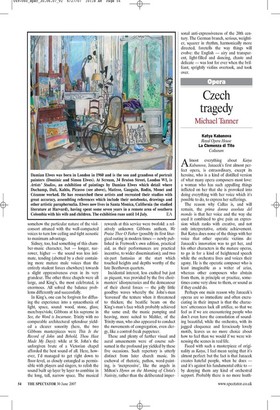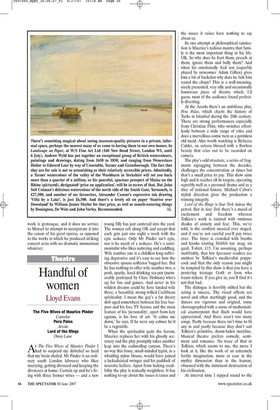Czech tragedy
Michael Tanner Katya Kabanova Royal Opera House La Clemenza di Tito Coliseum lmost everything about Katya Kabanova, Janacek's first almost perfect opera, is extraordinary, except its heroine, who is a kind of distilled version of what many opera composers most love: a woman who has such appalling things inflicted on her that she is provoked into doing everything with her voice which it's possible to do, to express her sufferings.
The reason why Callas is, and will remain, the prima donna assoluta del mondo is that her voice and the way she used it combined to give pain an expression which ranks with creative, and not only interpretative, artistic achievement. But Katya does none of the things with her voice that other operatic victims do: Janacek's innovation was to get her, and his other characters in the mature operas, to go in for a kind of heightened speech while the orchestra lives and voices their agony. He is the operatic composer who is least imaginable as a writer of arias, whereas other composers who abstain from them, in principle or practice, sometimes come very close to them, or sound as if they could do.
Perhaps one main reason why Janacek's operas are so immediate and often excruciating in their impact is that the characters' utterances lack all artifice, so that we feel as if we are encountering people who don't even have the consolation of sounding beautiful, while the orchestra, with its jagged eloquence and ferociously lovely motifs, leaves us no more choice about how to feel than we would if we were witnessing the scenes in real life.
Faced with such a masterpiece of originality as Katya, I feel mean saying that it's almost perfect: but the fact is that Janacek creates hateful people, when he does — and it's against his fundamental ethic to — by denying them any kind of orchestral support. Probably there is no more loathsome figure in operatic literature than Kabanicha, Katya's mother-in-law. She has no redeeming quality, and no explanation is even implied as to why she is so ghastly; whereas in Jenufa the far more sympathetic Kostelnicka has a long narration (now no longer cut) which shows how she was bullied by life into hardness. That does mean that Janacek, in Kaiya, has to violate a deeply entrenched artistic maxim and produce a crucial character who can hardly be said to be brought to life. All she does is remonstrate, with varying degrees of viciousness and thus of noise. It can hardly be a part that singers are impatient to take.
In the latest revival of Trevor Nunn's production at the Royal Opera, Felicity Palmer is staggeringly forceful in the role, her voice harsh and rasping, her bearing just as rigid, no hint of anything except frozen self-righteousness. No one can stand up to her, and the only tiny hint of comedy in the production (possibly in the work) is the sub/dom relationship that may exist between her and the merchant Dikoj, father of Katya's lover Boris. Any Katya would wilt beside her, but the radiant, dreadfully vulnerable Katya of Janice Watson makes the opera more painful than ever by being both so open and so gentle, irresistible to a woman of Kabanicha's vengefulness. Watson is a glorious stage presence; when not embodying a role she seems doll-like, or Netrebkolike, but give her a chance to act and she floods the stage with the warmth of her acting as well as the glow of her voice. The long scene in which she keeps failing to say what she meant to is as nearly unbearable as any I have seen on any stage. And she is supported by a superb and starry team, only Toby Spence's Kudrjas, well sung as it is, seeming to be a run-of-the-mill piece of operatic acting.
The staging of Maria Bjornson, a combination of the naturalistic and the expressionistic, should perhaps be retired, or saved for a 1950s-style revival of the Ring, when it would serve perfectly for Briinnhilde's rock. And surely the horses have earned a rest. That cavil aside, the central thing of all to celebrate is Charles Mackerras's conducting. Has even he ever made so sure that the score had no single dead note, managed so skilful and moving a navigation of both its continuities and its ruptures? He paced it more broadly than he sometimes has in the past, and the result was one of the most memorable evenings I have spent at Covent Garden.
ENO's revival of David McVicar's La Clemenza di Tito is excellently conducted by Edward Gardner, and the singing is distinguished, though Emma Bell's Vitellia verges on caricature. Paul Nilon does what can be done with the tiresomely all-forgiving Tito, someone Mozart clearly didn't warm to. Juxtaposed with Kaiya, the frigid formality of this stilted work is grotesque, and it does no service to Mozart to attempt to incorporate it into the canon of his great operas, as opposed to the works in which he produced striking concert arias with no dramatic momentum whatever.




















































































 Previous page
Previous page